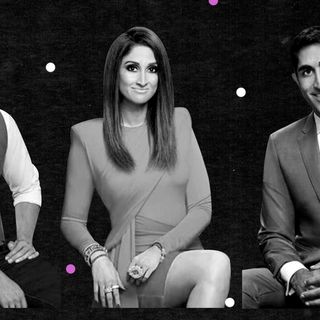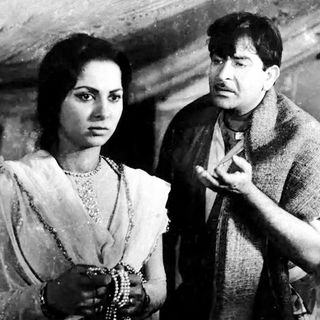
Why Were There Almost No Women In India’s Liquor Store Queues?
“I have a constant fear that someone would judge me to be a ‘loose woman’ one of these times and follow me home.”

The liquor stores in India have always been a masculine space — most salespeople behind the counter are men; customers are also predominantly men unafraid to mosh themselves against each other while yelling their orders and thrusting their bills forward. This was only amplified when the Indian government eased lockdown restrictions this week, and photos of around-the-block liquor store queues, full of men, flooded social media.
So stark is the absence of women from these lines, that a smattering of women showing up outside a liquor store in Bengaluru compelled Bollywood director Ram Gopal Varma to tweet “Look who’s in line at the wine shops … So much for protecting women against drunk men,” which incited severe backlash from women asserting their drinking habits with indignation in the comments section. Varma’s comment is sexist, but his surprise at seeing women in these queues isn’t so far off-base — women don’t frequent these alcohol joints, as clearly seen in today’s on-the-ground reality. Why?
“Mainly, it’s the staring or repeated glances. Sometimes the [men] try and get a bit close which makes my anxiety shoot up immediately,” Imaan, 23, says. “Sometimes, they try to talk for you to the counter guy and that makes me uncomfortable too because it’s not something I asked for or needed.” In addition to the customers, Imaan says, “Every now and then, you also get a guy at the counter making you a bag who will give you a look, especially when I have a large order.”
Related on The Swaddle:
Menstruation Is a Negotiation With Survival For Many Women
Alcohol consumption in India is on the rise, and within this trend, more women are also drinking more frequently, the Times of India reported. The societal stigma attached to women drinking, however, isn’t disappearing as fast as women’s habits are changing, resulting in awkward, sometimes downright dangerous situations culminating in spaces such as the liquor store.
Chitra, 27, relays an incident when she was carrying unbagged beers down the street and a man slapped her butt and rode off. “I came to an illogical conclusion that it happened because I was carrying beer,” Chitra says, adding she’s been taught women who drink alcohol are “unacceptable” and they must maintain their “sanskari” demeanor. “I have a constant fear that someone would judge me to be a ‘loose woman’ one of these times and follow me home.” The internalization of these sexist tropes, coupled with the stares and glances she says men give her at liquor stores, has led her to “avoid liquor shops at all costs,” Chitra says, adding she has resorted to asking her friends or husband to get booze for her.
For others, the shame attached to buying alcohol — the kind specifically reserved for women in India — prevents many from frequenting the liquor lest they are recognized by a tattle-tale neighbor-spy. Miloni, 24, says she experiences intense discomfort when at the liquor store, mainly arising from a fear of being recognized by people from her locality, and being judged for being at the liquor store. When she does visit, Miloni says, “I want to get out of there as fast as I can. I usually try making the transaction as fast as possible and avoid all eye contact with other customers.”
Related on The Swaddle:
Alcohol Abuse Is a Spectrum, From Social Drinking to High-Functioning Alcoholism
The microcosm of the liquor store shows no matter how often feminism tells women to take up space and not capitulate to self-objectification — looking at their own selves through another’s eyes and change their habits to control that perception — the automatic, deep discomfort caused by highly masculine environments makes it impossible to do. Trisha, 21, says she has to remind herself she’s not doing anything wrong when she goes to buy alcohol at the liquor store. If she’s alone, she says, “I look down and don’t look at anybody. I try not to get noticed … a liquor store is under the stronghold of a man’s world where women aren’t expected to walk in and those who do are stared upon.”
To avoid that, Trisha not only changes her behavior but often also the way she dresses. “I try to dress up conservatively when I go to liquor stores because it has occurred before where I have stepped in wearing shorts and ‘invited’ the male gaze, for not only dressing inappropriately but also for doing something inappropriate — buying alcohol,” Trisha says. “So it feels like it’s a double attack — on my choice of clothes and my choice of buying liquor.”
For others, this discomfort results in women attempting to curb their femininity, in an attempt to better fit in. “I think about how I’m usually surrounded by men and how I need to make sure my voice is loud and curt enough for the shopkeeper to take me seriously,” Anahita, 24, says, adding she adopts a “tough” demeanor to remain insouciant in front of the men staring at her and to ensure they don’t speak over her. “I feel like I’m playing a character, like I’m trying to pretend to be a man,” Anahita says.
For women, the liquor store embodies a near-perfect, undiluted illustration of how patriarchal socialization plays out in real-time, laying bare all the stigma, internalized sexism, and deeply-entrenched gender roles that control women’s movement and behavior in society. To combat this, some cities in India have opened up women-only liquor stores, in order to insert a semblance of safety and comfort into the process of purchasing alcohol. Post Covid19 lockdown, as liquor stores around the country open up, it’s important to remember the evolution of social norms is simply the first step when we talk about progress. In order for them to play out in reality, our institutions will need to catch up.
Rajvi Desai is The Swaddle's Culture Editor. After graduating from NYU as a Journalism and Politics major, she covered breaking news and politics in New York City, and dabbled in design and entertainment journalism. Back in the homeland, she's interested in tackling beauty, sports, politics and human rights in her gender-focused writing, while also co-managing The Swaddle Team's podcast, Respectfully Disagree.
Related


Family Karma Is a Fun Skim Through the Conflicted Lives of the Privileged Indian Diaspora
